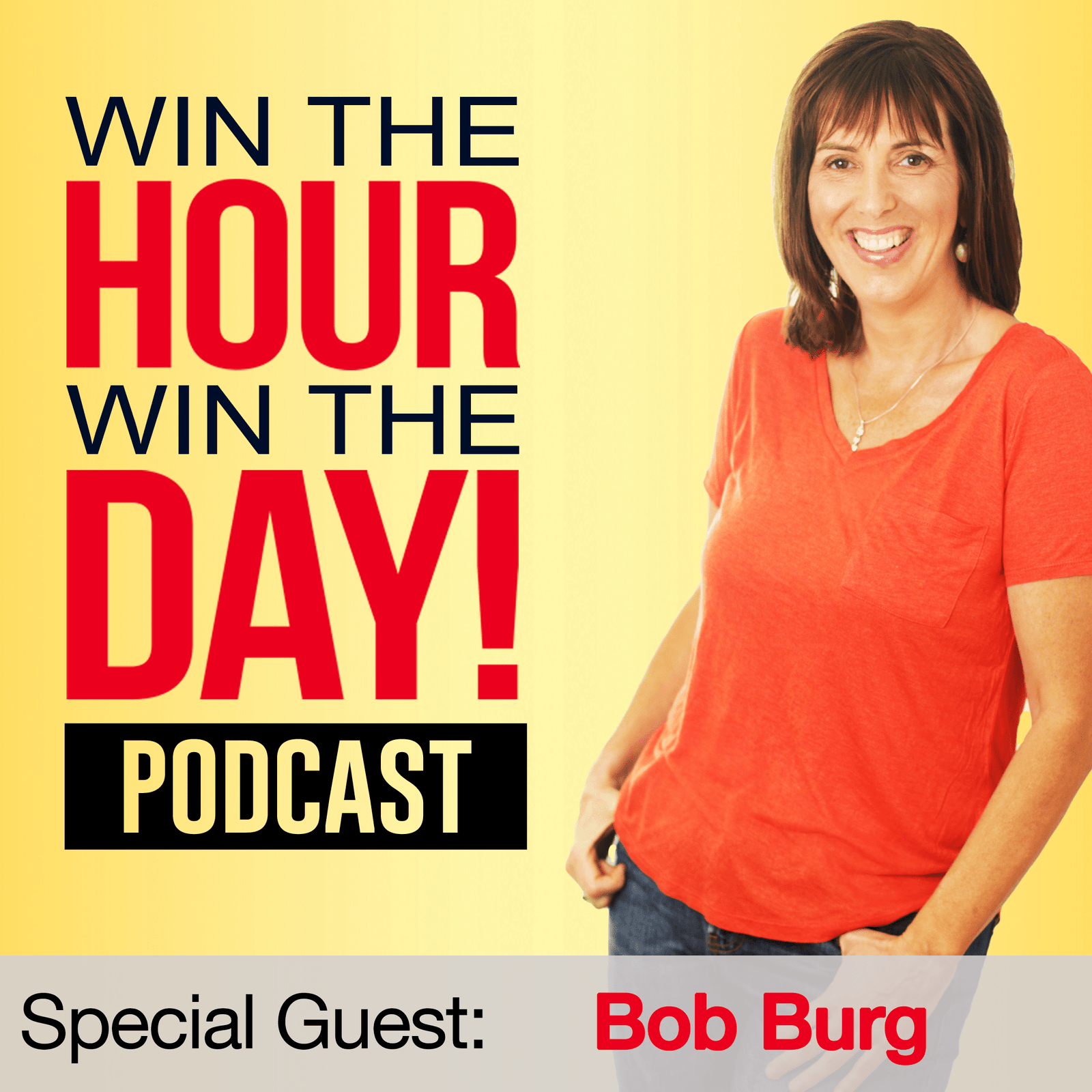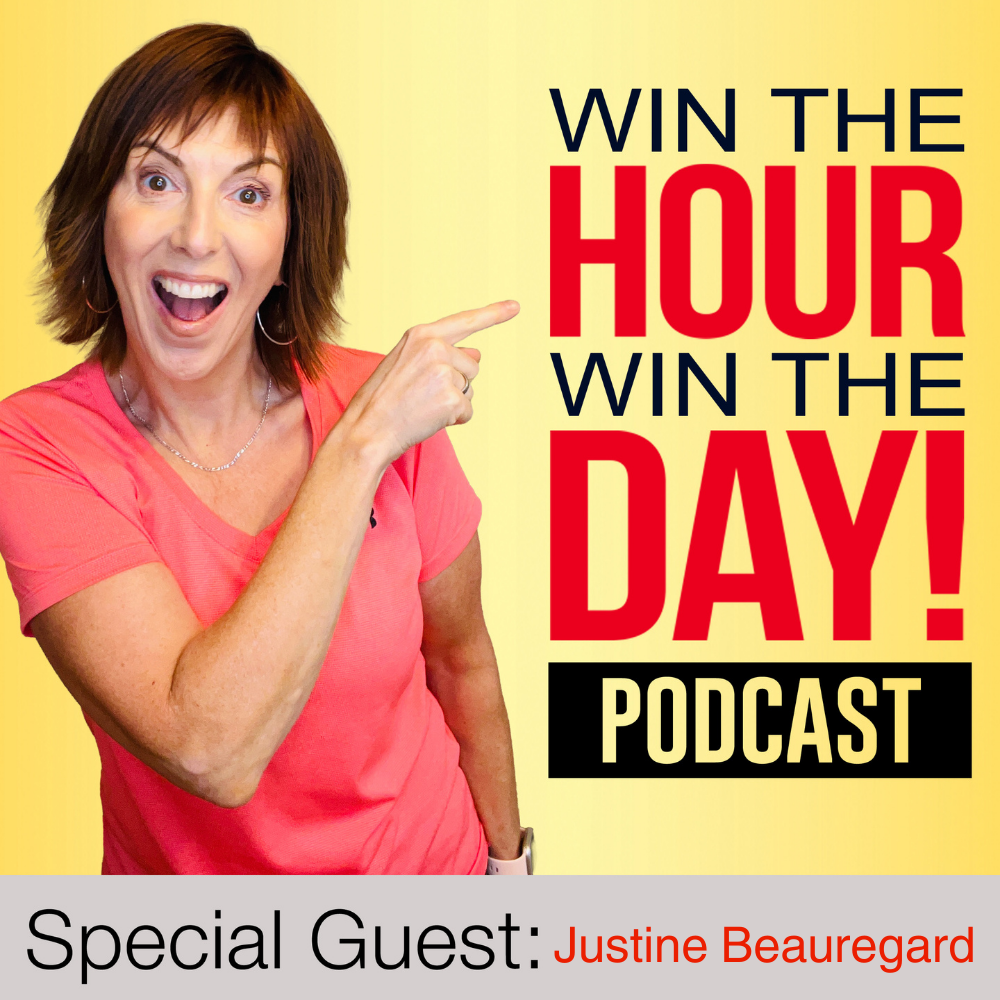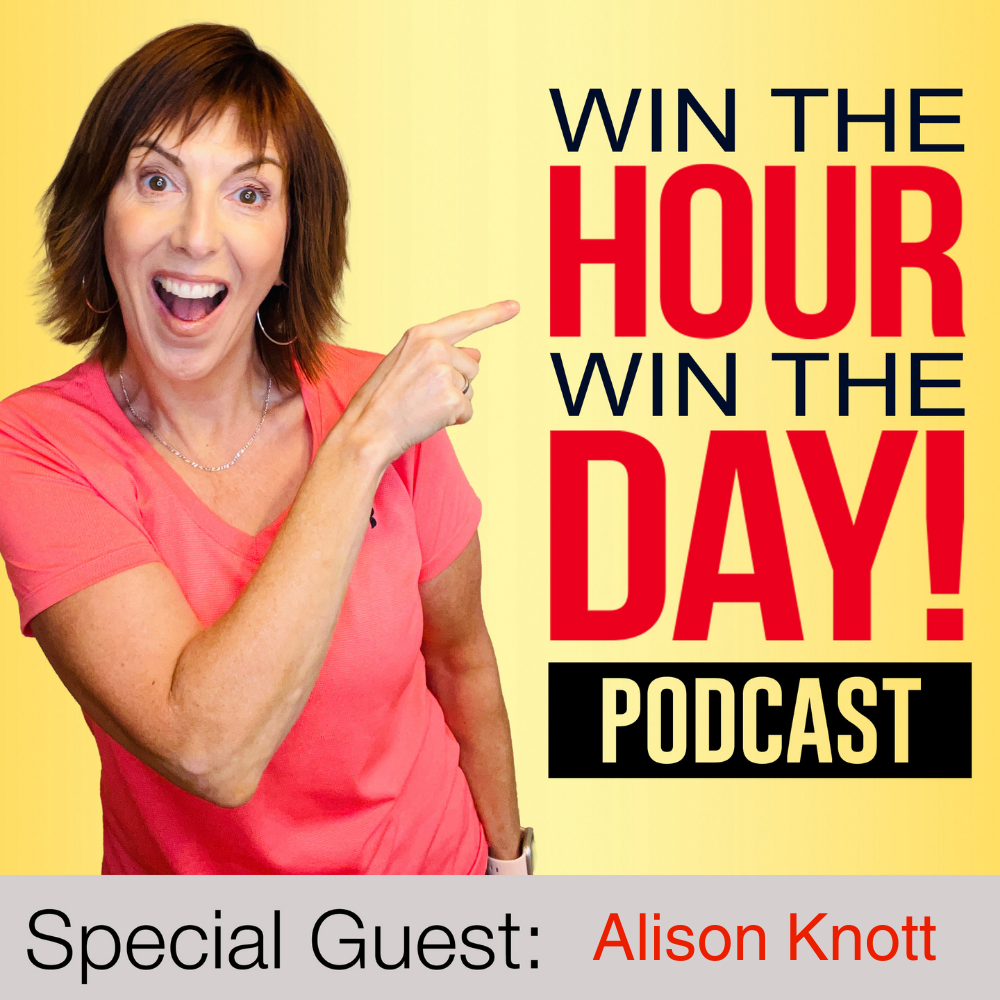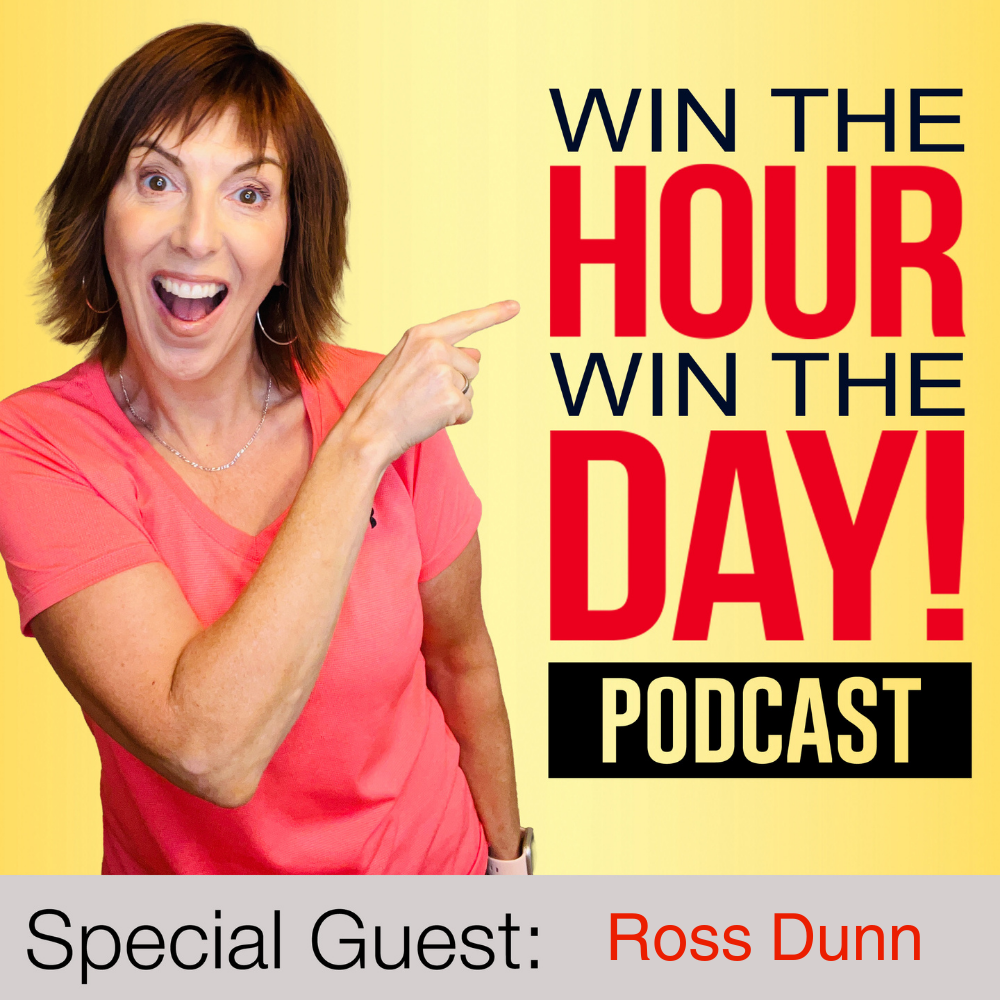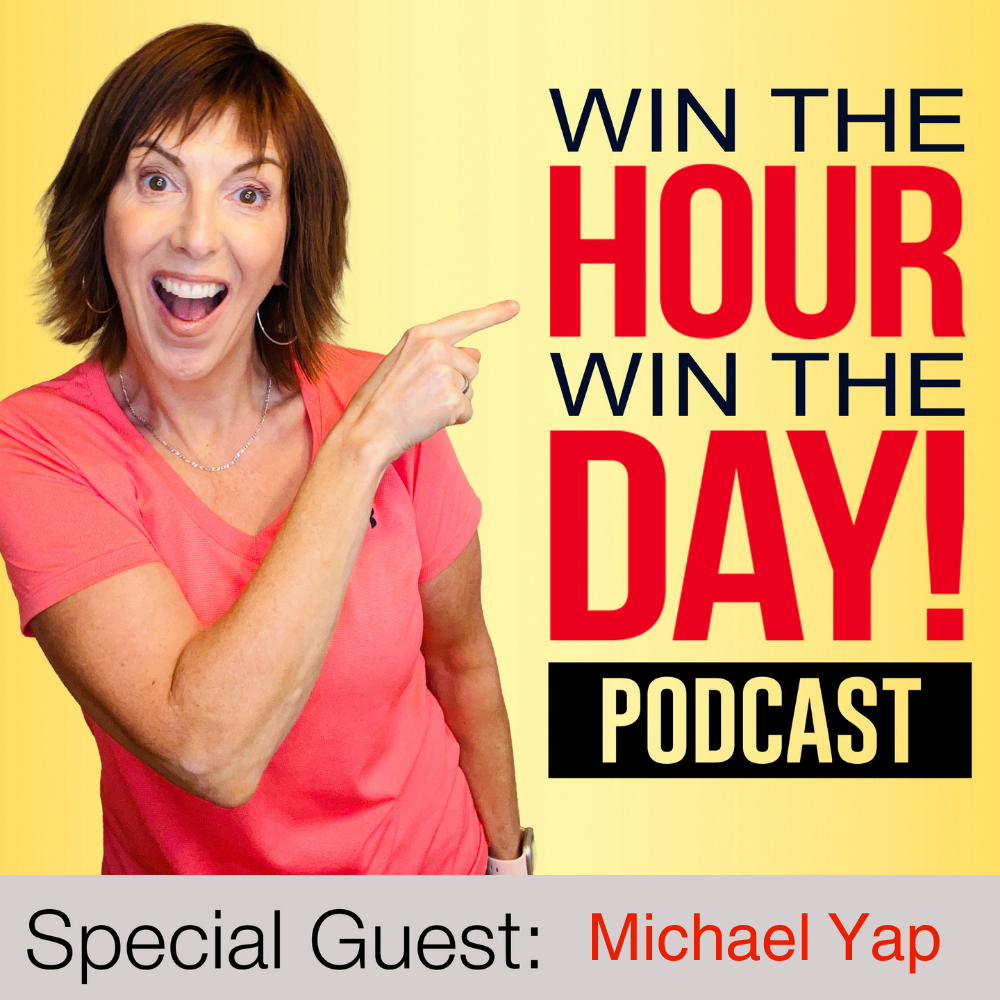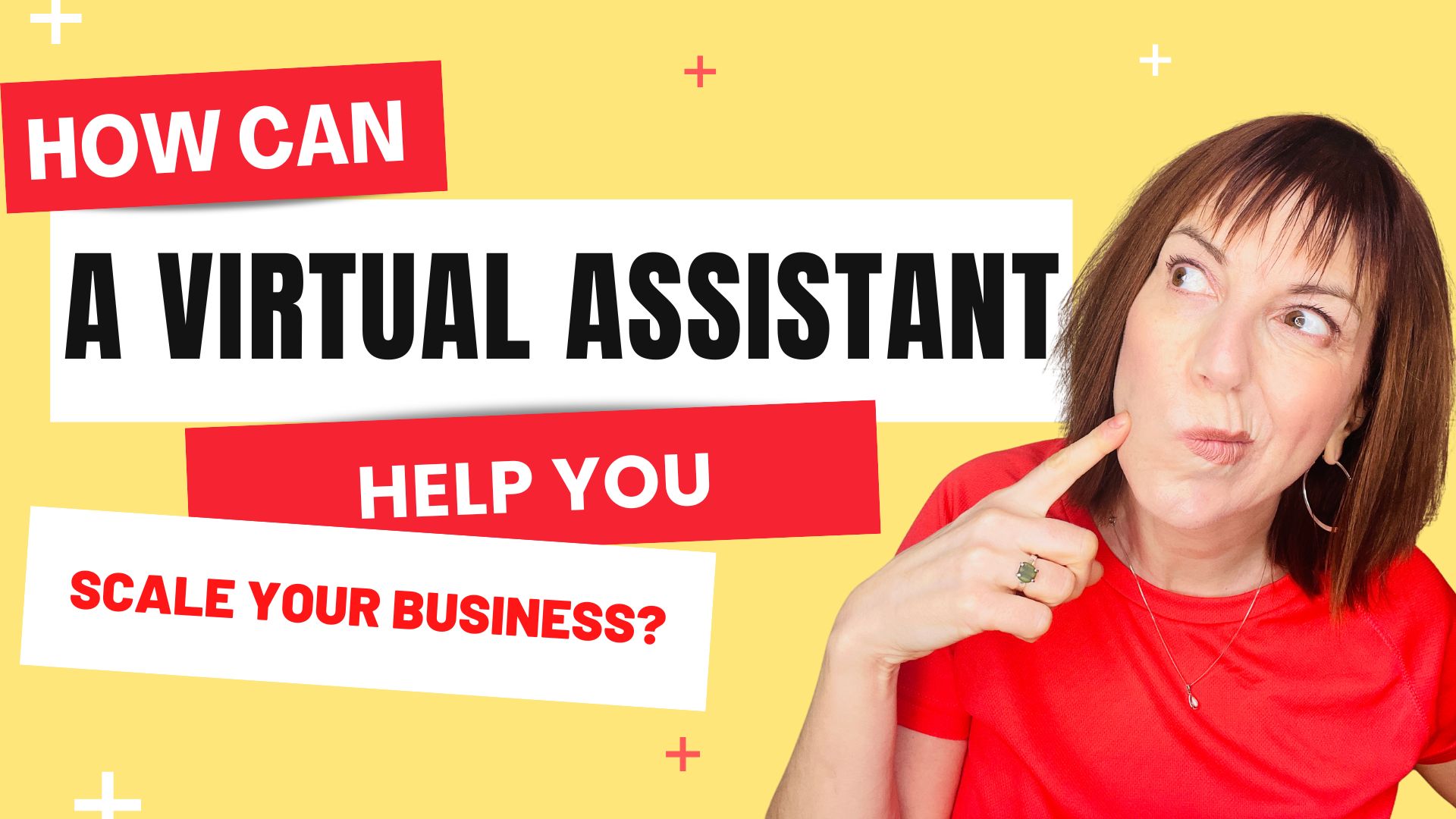Episode Summary
You can find Bob Burg at:
Website: https://thegogivercommunity.com/
Email: bob@burg.com
LinkedIn: https://www.linkedin.com/in/bobburg/
Win The Hour Win The Day
https://winthehourwintheday.com
Bob Burg Podcast Transcription
START[00:14:46]Kris Ward: Hey, everyone. Welcome to another episode of Win The Hour, Win The Day. And I am your lucky host, Kris Ward. And why am I lucky? We have Bob Burg in the house, he is going to be a game-changer for you.
[00:14:58] This is going to be a super exciting time, oh my heavens. So let me just gloss over a few things. If you somehow, some way do not know who Bob Burg is at this time, you will want to. Okay. So he is known for his classic endless referrals book. I mean, that’s a game changer right there. You’ve got to get that book right away.
[00:15:19] And then he has now become the coauthor of a fantastic series called The Go Giver. And I can’t wait to talk to Bob about what I got from that, but just so you get an idea. We’re talking about sold more than 1 million copies and has been translated into 30 languages and rated number 10 on Ink Magazines of the most motivational books ever written. It’s more than motivational, it’s practical.
Let’s get to it! High end stuff. So Bob, we are just thrilled that you fit us into your calendar. Thank you. And welcome to the show.
[00:15:53]Bob Burg: Well, it’s my pleasure. I’m honored to be with you. Thanks for having me.
[00:15:57]Kris Ward: Well, okay, so listen, let’s get to it. You are probably the most misquoted person ever on, I don’t know, planet earth maybe.
[00:16:07] And so, you guys all out there, you have been using Bob’s quote and you probably don’t know you have, and you don’t know you’ve been butchering it as well. Right? So Bob, why don’t you dive in and tell us the quote that’s been slapped around out there that, you know, they’re not tagging your name on every time they say this and that quote is…?
[00:16:27]Bob Burg: Oh, you must be talking about all things being equal. People will do business with and refer business to those people they know, like and trust.
[00:16:37]Kris Ward: Yes. So we’ve all slandered that, but this is the guide. This is the man. This is the myth, the legend that says, listen, it’s about doing business with people, you know, like, and trust and we’ve slim that down, but that was in its entirety.
And I think that we all use that as our staple. So I just wanted to tap into that right at the top of the hour.
[00:16:57]Bob Burg: Very kind. Thank you.
[00:16:58]Kris Ward: Yes, Bob. Now I’m just going to tell you a little short story, and then I’m going to get you totally. I’m going to get out of your way, because listen with that aptitude of business that you have, and that radio voice that you got, they do not need to be listening to me.
[00:17:12] I want to tell you. So I’ve read every one of your books, but the Go-Giver sells more. I have heard over and over again about the whole-be-of service and I get it. And I would like to think myself as a thoughtful giving person to the point where sometimes I had to learn how to set boundaries so that you receive as much as some balance of receiving and giving.
[00:17:36] Life lesson there. Okay. So why do I tell you about that? It’s not to toot my own horn and saying like, I come from that position, anyhow. So I thought…I was reading really, honestly, reading your book, I thought reading it out of loyalty and be thinking you can always learn more. Of course there’ll be some angle, some perspective, but I could not put the book down.
[00:17:56] And a couple of times that day, somebody, you know, like even my mom called to ask me something, I’m like, Listen to this story, this book, like she doesn’t care. Right. And like, listen to me. And one that hugely dumped out for me was the one about Heather, the VP of City Mortgage. And I will paraphrase this really shortly.
[00:18:15] And then you can expand on this. Is she and a bunch of colleagues at high level positions have lost their job? And then they were all having trouble getting their jobs. I’m telling you Bob, right? Like, cause if you don’t know, and then here’s the really fascinating part to me, which is where I want to start the show with is, you know, then they joined together and said, look, they’re all having trouble finding jobs.
[00:18:37] So they joined together. So the whole premise of it was you could only join if you were willing to help others find a job. And I have to say, I told everyone I ran into that week about this story because gosh, I’ve been told I’m thoughtful, I’m generous and giving, but I got to say, I don’t know if I would have had that insight.
[00:18:56] You would have got this whole, I’m having trouble getting a job. I got to take care of this first. I have my family and then I’ll come back and help you. But I could see when the story unfolded. That would have been the wrong path, but it was really astounding to me that I think even the best of the best would have fallen prey to that first and most exercised journey. So let me get out of your way, Bob.
[00:19:1]Bob Burg No, no, that’s fine. And it’s very natural. And you know, some of what we’re talking about in the books, and these were co-authored with John David Mann. Who’s a brilliant storyteller and writer. So I want to make sure to give him credit and not as though it’s just my book.
[00:19:39] Not at all. But, yeah. The basic premise is this and let’s start here because I think this will explain it, that shifting your focus. Right. And this is what Heather and her group did. Okay. Shifting your focus from getting to giving. And now when we say giving in this context, we simply mean constantly and consistently providing immense value to others.
[00:20:07] An understanding that doing so is not only a more fulfilling way of conducting business. It’s actually the most financially profitable way as well. And not for any kind of, woo way out there. Oh, just give and get that. No, we’re not talking about that at all. This is actually very rational.
[00:20:27] It’s very logical. Why? Because when you’re that person who can take your focus off of yourself and place it on others, place it on serving others. When you can move from an “I focus” or “me focus” to a “focus on helping that person solve or overcome their challenges”. When you can move that focus from you onto helping another person move closer to happiness, people feel good about you.
[00:20:57] People want to get to know you. They like you. They trust you. They want to see you succeed. They want to be in relationship with you. They want to do business with you if that’s appropriate at the time, they definitely want to tell others all about you. They want to be your personal walking ambassadors.
[00:21:15] So it’s really, we’re talking about human nature. Now you’ve got to come at this giving aspect from a very authentic base. Okay. Which is what you do. And I assume that’s what the people watching and listening also do. I often, when I speak at sales conferences, one of the first things I’ll say is nobody’s going to buy from you because you have a quota.
[00:21:41] Right, right. They’re not going to buy from you because you need the money or even because you’re a really nice person they’re going to buy from you because they believe that they will be better off by doing so than by not doing so. And that’s the only reason why anyone should or should be expected to do business with, or buy from you or from me or from anyone else.
[00:22:01] Now, this is great news. It’s wonderful news for that person, for that salesperson, for that entrepreneur who really has a desire to serve, right. And bring value to others. This is why John David Mann and I say, and we said this in Go-Giver Sell More. That money is simply an echo of value. Money
[00:22:25] is an echo of value. It’s the thunder. If you will, to values lightning, which means nothing more than that, the value must be your focus, the value you’re providing or given another person, the money you receive is simply a natural result of the value you’ve provided. So again, there’s nothing when we talk about giving in this context.
[00:22:45] So give me, there’s nothing about being a go giver that should be confused with being a doormat or a martyr or self-sacrificial, there’s nothing about that, right? No, no, I understand that. I just want to make sure that that’s understood when we say…
[00:23:0]Kris Ward: I’m sorry. I just want to amplify what you just said there. It was such a… I don’t want to sound woo woo. Cause I don’t want to say.. it was like spiritually uplifting. It was just such a positive life affirmation connected to things that somehow, you know, in your personal life, this is, you know what I do, what I do, what I do. And then it used to, I certainly don’t believe successful people are cold or self-serving or anything like this, but it took anything that thoughtful or generous or a surprise birthday or anything.
[00:23:32] I like to do my personal life and realize that should be amplified 10 fold in my business life because I reach more people there. I have a wider circumference than I do in my intimate family. So it, it was just really… it was really inspiring and life affirming to a level I’d never read before.
[00:23:52]Bob Burg: It means a lot to me. Thank you.
[00:23:55]Kris Ward: Yeah. So, so yeah. So explain the… keep going with the Go-Giver Series because it is something that I just think, “ah, man, we need to be ringing that bell and get you up there more.” Cause it’s a whole… it’s a game changer. So the Go-Giver is the opposite of the Go Getter.
[00:24:10]Bob Burg: Let’s talk about that. Yeah. We would say that a Go Getter if we wanted to find a Go Getter by someone who takes action, we think they’re complement. We want people to beat Go Getters. People who are, are people of action, because without action nothing’s going to happen, you can have the greatest thoughts, best ideas, the greatest of intent, but without action, nothing’s going to happen.
[00:24:36] So we would say the opposite of a Go Giver is a Go Taker. That’s the person who feels almost entitled if you will to take, take, take without having added value to the process, to the person, to the situation. So we’d say be a Go Getter and a Go Giver. Just don’t be a Go Taker.
[00:24:57]Kris Ward: Okay. Okay. All right. So in your… you’re just traveling, I mean, you just, your messaging is all over everywhere.
Like to the point, like I said, that people don’t even know… but the people don’t even know they’re referring to you or quoting you or whatever. So in your pearls of wisdom with all the books you’ve read and all the places you traveled, give us say the top three. And I know you’re such a generous, kind, articulate person.
[00:25:23] So I may be afraid with you to use the word mistakes, but what are three things that we could be doing better under the umbrella of how you see business?
[00:25:32]Bob Burg: Well, I think the first thing is that… and thank you for those nice compliments. It’s certainly very kind of you. I think it’s understanding that and you know, Dale Carnegie first said this in his, I don’t know, he said at first, but he certainly said this in an impactful way in his classic, How To Win Friends And Influence People.
[00:25:50] He said, ultimately, people do things for their reasons, not our reasons, right? Just like the person buying from you. Because they believe it’s going to benefit them. Okay. So I think we always have to keep in mind that great salesmanship, if you will, is never about the sales person. It’s never even about the product or service as important as those are.
[00:26:14] It’s about the other person. Right. It’s about that person whose life you’re choosing or trying to add value to. It’s really about when you think about it. And I know you’ll relate to this, Kris, cause it’s the kind of person you are, it’s really about another person’s life being better, just because you are part of it.
[00:26:35] And when we look at sales being shipped or sales person ship, I’m not sure how to say it now in a very legitimate way, you know, that’s really what it is. You know, the old English root of the word sell was salon, which literally meant to give. And so when you’re selling, you’re literally giving and so on.
[00:26:57] And so wait a second Burg you know, I get, that’s kind of wordplay though. Isn’t that semantic? I don’t think so. And here’s why, when you’re in the selling process, let’s say you’re about to do a presentation for someone, right. And, and you know, what are you given? Well, I suggest you’re giving that person time, attention, counsel, education, empathy and most of all value. So, if we want to put it in terms of mistakes, it’s not realizing that it’s all about that person. You know, it’s not about us and it’s not about our product or service.
[00:27:33]Kris Ward: That makes such sense. And you know, I get compliments from time to time about the videos of their content I put out online.
[00:27:40] And people are very kind about my energy. And what I would say is my goal was… my goal is when you enter a room or an interaction, I want to leave it. I want to have, you know, leave the room brighter than when I entered it. That’s my goal. And so what are you contributing to that interaction? And can you make it memorable and make lifts some of these days, you know, in any capacity, even in the grocery line, whatever.
[00:28:05] And yet, then you kind of switched gears. So as a business person, when you’re presenting information, cause you’re like, oh, I got to explain that they need this, they need this. And the urgency of, I know I can help you, but it, it comes off, yeah, it comes, it comes off in a different vein than you appreciate than you preach.
[00:28:23] And so I feel like. Even when we have those tools and we use them and we know they’re important, somehow we put them down or don’t use them as effectively in business and sales.
[00:28:33]Bob Burg: Right. Well, I agree. And again, because it’s natural. It’s very natural, they go, okay. I got to tell them all about this.
[00:28:39] Why? Well, because it’s a great product or service we have, we all believe it is right. I mean, when someone gets into a… specially in an entrepreneur, but typically anyone in sales or someone in business typically as human beings, we have a need to give, we have a need to make the world better. We have a need to add value to be part of something bigger.
[00:29:00] Right. We have a need to believe we’re making a difference in the world. Now, typically as an entrepreneur, we do this through our business, through our work. Now that doesn’t mean we can’t be involved in other charities, but I’m taught, but by and large, okay. We communicate our value. We live our values through our work, which is our product or service.
[00:29:19] So of course we think it’s the best out there and it would help this person so much if they don’t get it. So what do we do? We tell them why they should get it right. Okay. What we want to do is kind of go the other way and ask questions. Right. Okay. Ask questions and really listen and discover what they need, what they want, what they desire.
[00:29:49] And when we ask these questions, when we listen and we listen, not just to kind of sharp, angled them into a close, but listen. So we really get it. So we really understand. And then when they say something, we don’t assume that just because they said it, that we understand what they meant, because we know as human beings, we all see the world from different sets of beliefs.
[00:30:09] What I call our unconscious operating system, right. We all see the world in a certain way, and we assume others see the world the same way we do. They don’t, we are not our customers. We don’t know what they would find a value about what we do. So we’ve got to ask the questions and allow them to tell us.
[00:30:27] And then only when we really are, are pretty much as assured as we can be, that we understand what they’re looking for. Now, it’s time to connect the benefits of our product or service with what they have told us they need, want and desire.
[00:30:45]Kris Ward: Now having said that, I could still see where some of us, myself included where you get better and better, you know, not just to listen enough to, they go, they’ve stopped talking.
[00:30:54] So let me go. Here’s my thing. Right. Did I put enough time pretending I’m listening and asked you enough questions? Right. And then I think even when I think the most amazing teachers are the ones, not only are they teaching, what they set out to teach you, but then you hear it in different layers. So when I’m looking and listening to you, I could hear your pacing is different, you know, the breadth and how you talk is different and I’m realizing, oh, okay.
[00:31:18] I bet you his pacing is very different when he’s then when it is his turn to talk, it’s more of a gentle guide instead of great here’s boom, boom, boom, boom. What you need to know where we even with the best of intentions of just enthusiasm can be too blasting. Right.
[00:31:33]Bob Burg: But when we can, we continue to learn as we go along. I remember when I first started speaking professionally, I’m originally from outside of Boston and so we tend to talk very fast up there and it was like, boom, boom, boom, boom, boom, boom, boom, boom, boom, boom. And then the pace never changed. And you know, the feedback I would continually get was a, you know, it was exhausting listening to me.
[00:31:57] Right. And so I had to kind of learn how to slow down at certain times, stop at certain times, pause, speak at different speeds and do certain things. And for a while it was very difficult, but then, you do it enough times and then it becomes natural. You don’t really have to think about it.
[00:32:16] But I like to think like anything else, you know, you do it enough times and you start to internalize it. But yeah, I think it’s the same with selling and the same with listening and the same with knowing the questions to ask and knowing when, in like anything else. But we have to sometimes resist the human urges that we have to just kind of blast information and say, okay, now it’s time to ask questions and then really listen.
[00:32:46]Kris Ward: Yeah. And I think all the stuff that the different pieces I picked up and in all your different books, the layering was so subtle, but so profound. And I think the skill sets that wherever we acquired them from, let’s say we have X amount of skillsets, like level, I don’t know, four to 10, those foundational stuff, sort of repurposed what for me, what I already was effective at, or did know, but it changed everything else.
[00:33:12] Like it was, I don’t know, it’s maybe like a good pasta recipe and then you add another spice. It’s like, well, now it was a whole new game. Right? So it’s like, I thought I had a good recipe, but now I added this new spice and it’s everything. It’s just permeated through the whole menu. So to me, that’s it. It’s just so subtle, but so powerful.
[00:33:32] And there was just story after story and different ones of them that were just like, oh, I get it now I get it. You know, really just being more impactful and being more of service. But I think the being of service has been really understated and underserved with the, I don’t know, it just didn’t have the impact that you were able to deliver.
So I, again, touching on the service aspect of it. You know, go ahead, speak your wisdom. We’re just here to learn. Listen.
[00:34:01]Bob Burg: I mean, I think you’ve pretty much hit it on the head. And of course, John David Mann, the way he put that into words and of course he was a great entrepreneur himself, so he’s brought so much to the table. So, you know, it was a fun project to work on because
[00:34:16]Kris Ward: And if he was here, we’d beat him up too. So we’re not discrediting him because I went in the room.
[00:34:22]Bob Burg: No, of course not. I just want to make sure nobody thinks it was just me, but no, I mean, I think you hit it on the head and what it really is.
I’d say most of the people who have… who I guess, promote the book like you do and have been such great ambassadors. We’re also already embodiments of those principles anyway, like you and you maritally recognized yourself in them. Okay. So you know what, John and I are often asked where we were when the first book first came out, what is it that you guys put in this book?
[00:34:55] That’s anything new and different, and we’d always say nothing. Oh, no. I mean, universal laws are universal laws, but you know, successful people, there are five basic laws in the Go-Giver, right? The laws of value, compensation, influence, authenticity, and receptivity. Now they’re called different things throughout history.
[00:35:13] We gave them those particular names and wrote a story around it. But these are the same things that successful people have used forever. Many didn’t even know they were doing it. Some did it very intuitively and others. Right. But there’s nothing new. I remember Jim Roan who was one of the greatest business philosophers of all time and also a great entrepreneur and a fantastic author.
[00:35:35] He used to say, beware the person who comes to you promising new fundamentals. Right. There’s no such thing, right. Things have already been around for a long time. And so I think it’s the same here. And that’s why so many people in the book. And it did take off very fast. It got off to a very fast start and we’re very grateful for that.
[00:35:55] But I think it was because the first, the early adopters if you will, were the people who didn’t need it, they’re the people like yourself who already were doing business that way. And we got so many emails from people who said, oh, this is how I built my fortune. This is how I built my company. This is how I built this huge sales team.
This is how, but my people won’t believe me. So they used our book as sort of third party credibility.
[00:36:22]Kris Ward: Well, I think though, like I said, that story, the top of the show that really, I don’t know whether I would have been, that person would have taken care of getting my own job first thinking, you know, if nothing else I’m accountable to my family and I want, you know…
[00:36:35]Bob Burg: But there was nothing they were doing that was self-sacrificial though. Remember it was, they weren’t having any success going after. Oh, okay. I got it. Because they, what they discovered was… if you can Edify the other person, third-party credibility, you’re helping them get a job. Well, they’re also doing the same for you. And so, yeah, exactly.
[00:36:53]Kris Ward: And your network is bigger. Oh, your formula was astounding to me when you, like, when you said that, I thought, well, that makes sense.
Cause now you’ve got this network and you can recruit each other’s resumes and you can read each other’s contacts. And even though you think you’re in competition, everybody is different formula to the same thing. So you’re really not in competition, but I really think so many of us would have been shortsighted thinking, well, my husband’s very supportive, but I want to stress the family.
[00:37:18] So I got a D, you know what I mean? So I would have. Yeah, and very short-sighted, but that formula, I was like, that made such sense. Yeah. Awesome. Okay. We only have a couple of minutes, time flies with you. It’s just unbelievable. You’re like a business church. So on your parting note, what would be the last bit of wisdom that you’re generously throwing our way as we wrap up this conversation?
[00:37:43]Bob Burg: Oh, well, I mean, I would share the wisdom of a person who I consider to be a mentor, even though I don’t even recall this person’s name. I think I only met him a couple of times and he just happened to have some great advice right when I needed to hear. One of my good mentors who are great friends and mentors, Dondi Sue Mochi, who she is.
[00:38:04] One of the top leadership strategists and mentors in the world for huge companies all over. And we call these… we were in a discussion. We were talking about this. We call these people “drive by mentors” because they just happen to be there. They just happen to drive by or walk by, or be in the coffee room or whatever it has to be and say the very thing you need to hear at the moment you’re ready.
[00:38:28] And you need to hear it. And I was in a sales slump early in my sales career, and I was really pressing and because of this I was focused on me, right? Not on my customers. I was focusing on getting out of this lump and making the sale. And he said to me, and he wasn’t even in the sales department, I think he was an engineer.
[00:38:46] And I think he retired soon after just a nice older guy. And he said, “Burg, can I give you some advice?” I said, “Yeah, please do. I needed it.” He said, “If you want to make a lot of money in sales, don’t have making money as your target. Your target is serving others. Now, when you hit the target, you’ll get a reward.
[00:39:10] And that reward will come in the form of money and you can do with that money, whatever you choose, but never forget the money is simply the reward for hitting the target. The money is simply the reward for hitting the target. It’s not the target itself. Your target is serving others.” And I think when we approach business that way, I think that when we approach sales that way, Kris, I think we’re really nine steps ahead of the game in a 10 step game.
[00:39:43]Kris Ward: Oh, my gosh. I heard angels sing.
[00:39:48]Bob Burg: You’re wonderful.
[00:39:49]Kris Ward: Bob, you’re so generous. I just don’t have the gumption to call you Burg. So I’m going to go. I should have gone, but yeah. Thank you so much. And you know, everybody, I always ask our guests, where can they find more of your wisdom, but please just key his name in online.
He’s everywhere, or get yourself over to Amazon and treat yourself. Boom, boom, boom. Just start getting those books and that, yeah.
[00:40:13]Bob Burg: I would suggest if people would like to that they visit – the go (without the hyphen), thegogivercommunity.com. This is the community my business partner, Kathy and I’ll put together, filled with go-givers building their business, living their life, providing value to others and receiving. And so I would certainly make that invite.
[00:40:37]Kris Ward: Oh, yes. How dare I speak for you? Absolutely, Go Giver Community. Always wise words. gogivercommunity.com. Okay. We will make sure to put that in the show notes for sure. Everyone else, we will see you in the next episode. And once again, Bob, thank you so much.
END[00:40:52]Bob Burg: Oh, my pleasure. Thank you! [00:40:53]

